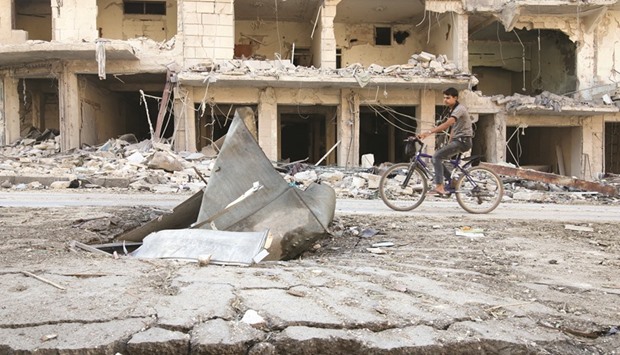A pause in Russian and Syrian strikes on Aleppo was holding for a second day yesterday, ahead of a brief unilateral ceasefire aimed at allowing civilians and rebels to quit the devastated city.
Moscow announced it would extend an eight-hour truce planned for today to 11 hours and said Syrian and Russian warplanes were giving Aleppo a wide berth.
At a meeting in Berlin, French President Francois Hollande said he would work with Germany to persuade Russia to adopt a long-lasting truce around Syria’s second city.
Russia’s ceasefire plan has stirred scepticism in the West and the United Nations said it would be insufficient to allow humanitarian aid to reach encircled Aleppo inhabitants.
Moscow is backing President Bashar al-Assad’s regime in its war with a wide range of rebel groups, including with air strikes in the divided northern city.
Under growing international pressure over the devastation and civilian deaths, Moscow announced early Tuesday that Russian and Syrian warplanes would stop bombing rebel-held parts of the city to pave the way for a “humanitarian pause”.
That window, starting at 0500 GMT today, was initially meant to last eight hours and is expected to see all fighting stop to allow civilians and rebels to exit opposition-held districts via six corridors.
Senior Russian military official Sergei Rudskoi said yesterday the ceasefire had been extended “by three hours until 7pm (1600 GMT)”.
He also said Russian and Syrian planes were keeping 10km from Aleppo.
An estimated 250,000 people live in Aleppo’s eastern districts and have been under near-continuous government siege since July.
AFP’s correspondent in east Aleppo said although clashes between rebels and pro-government forces involving heavy artillery continued in several neighbourhoods, the pause in air strikes was holding.
The Syrian Observatory for Human Rights, a Britain-based monitoring group, said pro-regime fighters were pressing their ground assault in the Old City as they vied to shift the front line.
Russian and Syrian bombardment had been providing air cover for a government offensive that started on September 22 aimed at seizing the city’s east, held by rebels since 2012.
According to Moscow, once the pause begins six corridors out of the city would open for civilians with another two – via the Castello Road in the north and Souk al-Hal in the city centre – designated for rebels.
The UN dashed hopes however that a prospective Aleppo truce could allow humanitarian aid to reach civilians.
“Before we can do something really meaningful we need assurances from all parties” over a lasting ceasefire, a spokesman for the UN’s humanitarian agency said in Geneva.
Rebel groups have indicated they will not abandon their posts and, with Aleppo encircled by pro-government forces, many civilians fear falling into the hands of the regime.
But Russia has said the pause is an opportunity for mainstream rebels to disassociate themselves from militants in Aleppo.
Near Damascus, more than 600 rebels and their families were evacuated yesterday from Moadamiyat al-Sham, a besieged rebel town, according to a local official.
It was the latest in a string of evacuation accords allowing armed rebels to flee encircled areas, which Damascus has championed as a way to restore stability.
Syria analyst Thomas Pierret, of the University of Edinburgh, said the halt in Russian air strikes was about Moscow “managing international pressure”.
“Russia is periodically trying to mitigate tensions with the West on Aleppo through such initiatives.
This is the continuation of war by diplomatic means,” he said.
In Brussels today, EU leaders are expected to “strongly condemn the attacks by the Syrian regime and its allies, notably Russia, on civilians in Aleppo”, according to a draft obtained by AFP.
The draft calls on them “to bring the atrocities to an end and to take urgent steps to ensure unhindered humanitarian access to Aleppo and other parts of the country”.
Five years of diplomatic initiatives to put an end to Syria’s conflict have failed, but over the past week world powers have made new efforts to reach a lasting truce.
Hollande and German Chancellor Angela Merkel were to meet with Russian President Vladimir Putin in Berlin later yesterday to discuss the ceasefire plans.
“France will do everything it can to exert pressure, especially on supporters of the (Syrian) regime, such as the Russians, so that the ceasefire can be extended,” Hollande said.

A man rides a bicycle near damaged ground in the rebel held besieged al-Sukkari neighbourhood of Aleppo, Syria yesterday.
